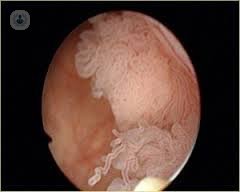What types of bladder cancer exist?
Written by: Bladder cancer is a malignant neoplasm that arises from the mucosa (transitional epithelium) lining the urinary bladder. There are different types of bladder cancer depending on the malignancy of the tumor cells which make. 
The bladder is a hollow organ formed by a smooth (detrusor) muscle whose function is to store urine between urination and urination. The epithelium that covers it has a very particular characteristic and its total impermeability. This feature mucosal epithelium or prevents bladder toxic or irritating substances excreted in the urine entering the detrusor muscle and thence through the body.
Bladder cancer is an abnormal and uncontrolled growth of the mucosa. In Urology three types of bladder cancer are distinguished:
- transitional cell carcinoma: is the most common and is derived from the transitional cells lining the bladder wall.
- Squamous cell carcinoma: new formation that begins in the squamous cells, which are thin, flat cells that may form in the bladder after prolonged infection or irritation.
- bladder Adenocarcinoma is a type of cancer rare bladder that begins in glandular cells (secretory) that are in the lining of the bladder.
Depending on the malignancy of tumor cells comprising this, bladder cancer is classified into three grades (G):
- G1: It is a well-differentiated tumor. Tumor cells are very similar to normal and are of low malignancy.
- G2: moderately differentiated tumor is a. Tumor cells have different characteristics to the original. It is intermediate malignancy.
- G3: This tumor is poorly differentiated. The cells are very different from those of origin and have a high degree of malignancy.
The International Union of cancer makes the most globally accepted classification of these tumors, which is called the TNM classification. This classification consists of two main groups:
The first group are superficial bladder carcinomas. There are three types of tumors: Ta, Tis and T1.
- Ta: noninvasive papillary carcinoma or confined to the mucosa.
- Tis: carcinoma in situ. flat superficial tumor that respects the lamina propria.
- T1: tumor invades subepithelial connective tissue or invading the lamina propria.
The second large group of tumors are infiltrating bladder carcinomas: T2, T3 and T4.
- T2: tumor invading the bladder muscle layer.
- T3: tumor invades beyond the muscular layer or invading the perivesical fat.
- T4: tumor invading structures adjacent to the urinary bladder. It is divided in two:
Bladder Cancer Treatments
The type of treatment depends on the type of tumor diagnosed. The highest category of T and G detected in the bladder define the treatment.
- Ta-T1 tumors: these tumors are treated endoscopically by transurethral resection. The goal of treatment should be prevention of recurrence and progression.
- Tis (carcinoma in situ) can be treated in most cases with intravesical instillation of bacillus Calmette-Guerin (BCG)
- Superficial but highly malignant tumors (T1G3) have a high tendency towards progression. Usually they treated by transurethral resection and intravesical instillation of BCG. These are cases that should be monitored closely and where cystectomy, ie complete removal of the bladder, represents an important therapeutic role.
- T2 tumors or greater are infiltrating tumors and cystectomy is necessary in most cases.
- The disease with pelvic lymph nodes (N +) or distant metastasis requires a different treatment scheme associated with cancer chemotherapy and radiotherapy treatments.


